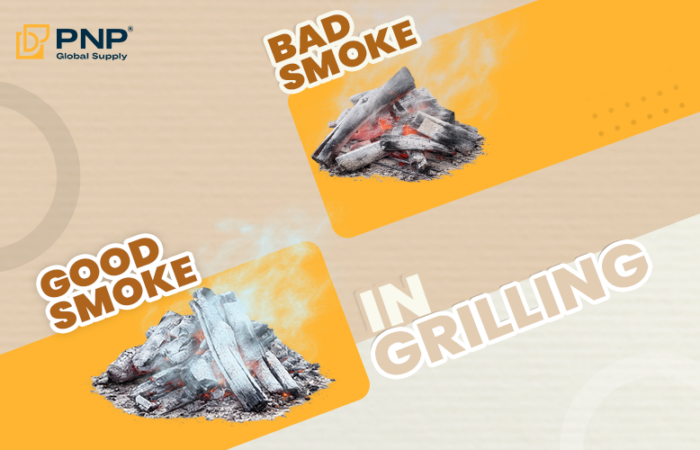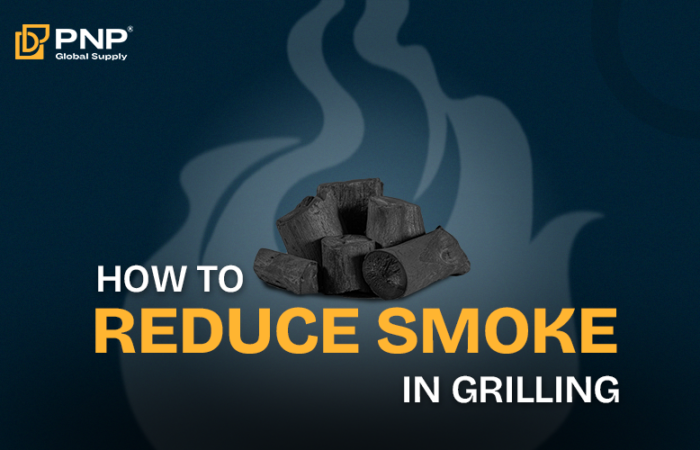When it comes to mastering the art of BBQ, choosing between a pellet grill and a charcoal grill is more than just a technological decision-it’s a lifestyle choice. Whether you’re a busy home cook or a seasoned pitmaster, understanding the nuances of each system is key to elevating your grilling game. This in-depth guide breaks down everything you need to know about these two popular grilling methods, ensuring you make an informed decision that suits your culinary style and budget.
Understanding the Pellet Grill
How It Works
A pellet grill, often referred to as a pellet smoker, is an innovative outdoor cooking device that uses compressed hardwood pellets as fuel. These pellets, typically made from oak, hickory, or apple, are fed automatically into a fire pot from a hopper. Here’s how the system works:
- Pellet Hopper & Feed System: The hopper stores the pellets, which are then automatically delivered to the fire pot as needed.
- Electric Igniter & Combustion: An electric igniter sparks the pellets, initiating the combustion process.
- Fan-Driven Airflow: A fan circulates air to ensure consistent combustion and maintain steady temperatures.
- Digital Controller: A user-friendly digital control panel allows precise temperature settings (e.g., 225°F for slow smoking or 450°F for direct grilling), much like an oven.
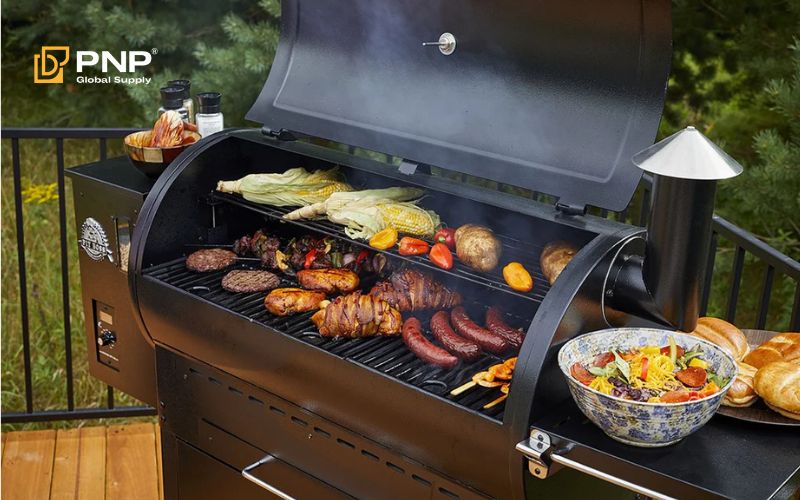
Pros and Cons of Pellet Grills
Advantages:
- Set-and-Forget Convenience: With automated temperature control, you can set your desired temperature and step away, making it perfect for busy lifestyles.
- Versatility: Pellet grills can smoke, grill, sear, bake, and roast, offering a broad range of culinary options.
- Subtle, Flavorful Smoke: The type of hardwood pellets used (mesquite, cherry, maple, etc.) provides a customizable and nuanced smoke flavor.
- Clean Operation: Electric-powered systems produce minimal ash, reducing cleanup time.
Disadvantages:
- Higher Initial Cost: Pellet grills range from approximately $300 to $1,500, and the cost of pellets is higher than that of traditional charcoal.
- Dependence on Electricity: The need for an electrical outlet limits their portability in off-grid locations.
- Milder Smoke Profile: For those who prefer a robust, intense smoke flavor, pellet grills may fall short compared to their charcoal counterparts.
- Mechanical Complexity: With more moving parts like augers and fans, there is a higher likelihood of mechanical issues that may require maintenance.
Real-World Applications
Pellet grills are ideal for home cooks and tech enthusiasts who value convenience and precision. They are perfect for slow-smoking tender ribs or achieving consistent results with brisket and poultry. The ability to “set-and-forget” allows you to host long outdoor parties without constant supervision, ensuring your food is cooked to perfection every time.
Delving into the Charcoal Grill
Traditional Operation and Core Features
A charcoal grill is the classic choice for BBQ, revered for its simplicity and authenticity. It operates by burning charcoal-available as lump charcoal or briquettes-to produce the heat and smoke essential for grilling. The process involves:
- Lighting the Charcoal: Using methods like a chimney starter to ensure even and rapid ignition.
- Airflow Control: Adjustable vents help regulate airflow and, consequently, the temperature.
- Smoke Generation: The natural fats from food dripping onto the hot coals produce flavorful smoke, creating that signature crust and deep, smoky taste.
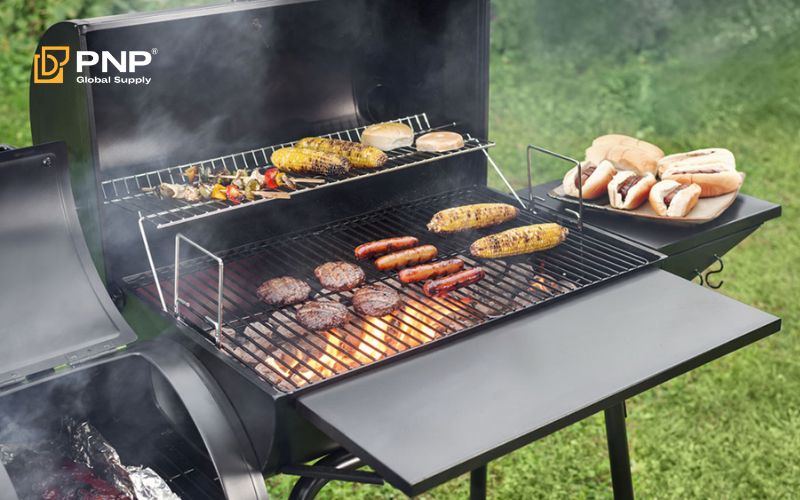
Pros and Cons of Charcoal Grills
Advantages:
- Intense, Authentic Flavor: The combination of high heat and natural smoke from burning charcoal delivers a robust, unmistakable BBQ flavor.
- High Heat Capability: Capable of reaching temperatures between 700°F and 1,000°F, perfect for searing steaks and burgers with a delectable char.
- Cost-Effective: Basic charcoal grills can be found for as little as $50 to $100, and the fuel (charcoal) is generally less expensive than pellets.
- Portability: Without the need for electricity, charcoal grills are ideal for camping, tailgating, and other outdoor adventures.
Disadvantages:
- Steep Learning Curve: Mastering the art of controlling the vents and arranging the charcoal takes time and practice, which can be daunting for beginners.
- Longer Preparation Time: Lighting charcoal and waiting for it to reach optimal temperature can take between 15 to 30 minutes.
- Messier Cleanup: The process generates a significant amount of ash and soot, demanding more thorough cleaning after each use.
Real-World Applications
Charcoal grills are perfect for those who appreciate the traditional BBQ experience. They offer an engaging, hands-on process where you can truly connect with the craft of grilling. If you relish the challenge of managing the flame and adjusting the heat zones manually, a charcoal grill not only meets but exceeds your expectations. Additionally, their portability makes them a favorite among outdoor enthusiasts who enjoy grilling in remote settings.
In-Depth Comparison: Which Grill Suits Your Needs?
Flavor Profile
- Pellet Grill: Provides a mild, wood-infused flavor with a nuanced smokiness that can be customized with various pellet types. This is ideal for those who enjoy subtle flavor variations.
- Charcoal Grill: Known for its bold, intense smoke flavor. The natural fats dripping onto the coals create a robust crust and deep, savory taste that is the hallmark of traditional BBQ.
Temperature Control & Cooking Time
- Pellet Grill: The digital control system ensures precise and consistent temperatures, reducing the need for constant attention and minimizing the risk of under- or over-cooking.
- Charcoal Grill: Requires manual control, where managing the vents and the placement of charcoal can result in varied heat zones. This method, though demanding, rewards experienced grillers with a unique and customizable cooking process.
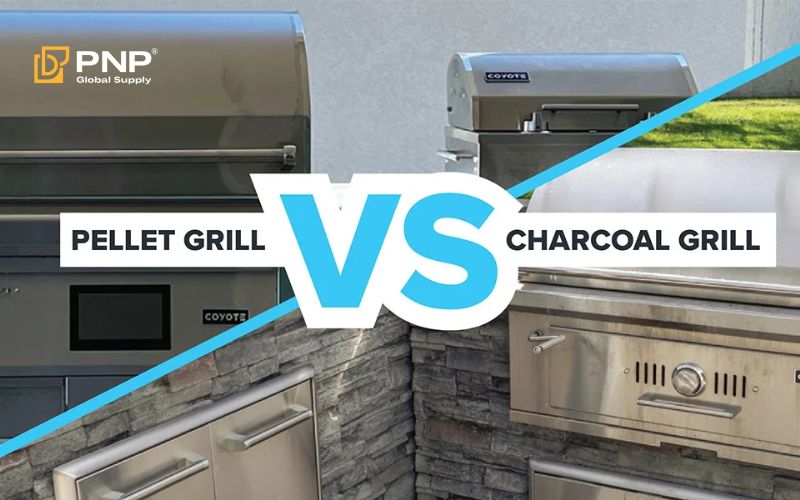
Convenience vs. Authentic Experience
- Pellet Grill: Offers unmatched convenience and ease of use with its “set-and-forget” functionality, making it ideal for home cooks who prefer a hassle-free cooking process.
- Charcoal Grill: Provides a more hands-on and traditional grilling experience, which many BBQ purists find both enjoyable and rewarding, despite the additional effort required.
Cost Efficiency
- Pellet Grill: While offering high-tech precision, the initial investment and ongoing cost of pellets can be a significant consideration.
- Charcoal Grill: Generally more budget-friendly, both in terms of purchase price and the cost of fuel, making it an attractive option for those looking to achieve great BBQ on a tighter budget.
Why Choose Quality Charcoal from PNP Charcoal?
For enthusiasts leaning towards the classic approach, high-quality charcoal is crucial for achieving the perfect BBQ. PNP Charcoal provides premium lump charcoal and briquettes, sourced sustainably to ensure a clean burn, consistent heat, and minimal ash production.
- Sustainable Sourcing: Responsibly harvested materials that contribute to a lower environmental impact.
- Optimal Performance: High-quality charcoal ensures a steady heat output and enhances the natural flavors of your grilled dishes.
- Expert Support: With years of industry experience, PNP Charcoal offers not only top-tier products but also expert advice to help you master your grilling technique.
Explore more at PNP Charcoal to enhance your BBQ experience with the finest charcoal available.
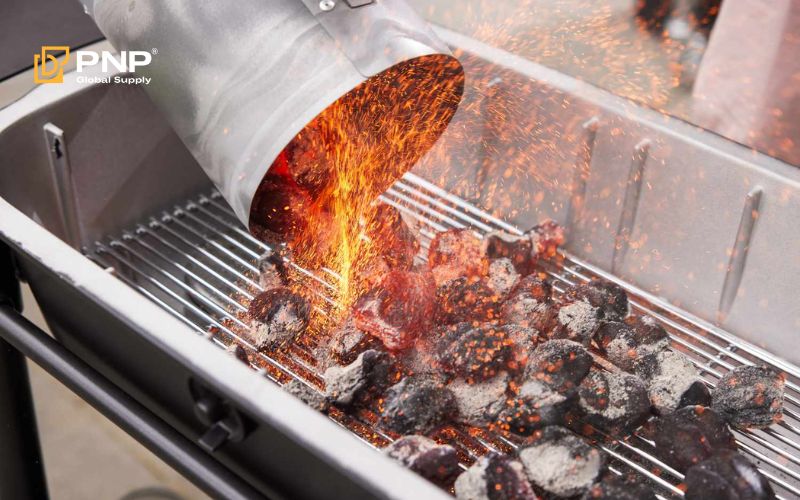
Making the Right Choice for Your BBQ Lifestyle
Ultimately, the decision between a pellet grill and a charcoal grill hinges on your personal preferences and cooking style:
- Choose a Pellet Grill if you value precision, ease of use, and the flexibility of multi-functional cooking with minimal supervision.
- Opt for a Charcoal Grill if you crave an authentic, hands-on grilling experience with rich, traditional flavors and don’t mind investing extra time in managing the cooking process.
Both systems offer distinct advantages that cater to different lifestyles. By understanding the underlying technology, cost implications, and culinary outcomes, you can confidently select the grill that best aligns with your BBQ aspirations.
Enjoy your BBQ journey and savor the flavors of expertly grilled food every time!
If you have any further questions or need personalized advice, feel free to reach out-our team is here to help you master the art of BBQ.

